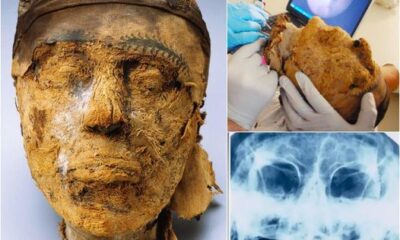News
UK Prime Minister Boris Johnson was unable to vote in person at a polling station due to forgetting his photo ID
Former PM made the requirement to bring photo ID a stipulation of the Elections Act in 2022

Boris Johnson was turned away from his local polling station when trying to cast his vote in Thursday’s elections after forgetting to bring the required photo identity.
The former prime minister was initially told by polling station staff he would not be allowed to vote in the police and crime commissioner election in South Oxfordshire without proving his identity.
The misstep was embarrassing for Johnson because the requirement to bring photo ID is a stipulation of the Elections Act he introduced in 2022 while in Downing Street.
The Electoral Commission has warned that hundreds of thousands of people could be excluded from voting because of the law, which it said could have a disproportionate effect on some groups.
A source close to Johnson confirmed he had forgotten the photo ID, but did later vote. “Mr Johnson voted Conservative,” a spokesperson added. Earlier on Thursday he had posted on X: “The polls are now open. Vote Conservative!”
It came after the veterans minister apologised to former military personnel who were prevented from using their veterans ID to vote in the local elections in England.
Downing Street said it would “look into” changing the controversial rules, which require photo ID in order to vote, to allow veterans’ ID cards on to the list of valid identification.
The minister, Johnny Mercer, was responding to a complaint from a veteran who said he had been turned away at a polling station. “I am sorry about this. The legislation on acceptable forms of ID came out before the veterans ID cards started coming out in January this year. I will do all I can to change it before the next one,” Mercer tweeted.
A government spokesperson said it was the intention to add the veterans’ card to the list of accepted ID and that defence identity cards for serving armed forces members were already accepted. “We are already consulting on this,” they said.
Rishi Sunak’s spokesperson said earlier that Downing Street had no concerns about voter ID more generally, adding: “We don’t want to see anyone turned away from polling stations, we want everyone to be able to vote. Experience from the last local elections was that 99.75% of people were able to cast their vote successfully.”
Ministers have faced significant criticism over the limited number of acceptable forms of ID, particularly the decision to allow documents such as the older person’s bus pass but almost none issued to younger ones, such as other travel passes and student documents.
The Electoral Commission warned last year that it was difficult to assess the consequences of requiring photo ID before voting.
It said the laws could have a disproportionate effect on poorer people, those with disabilities and people from minority ethnic backgrounds, and that the disfranchising effect of the law was very likely to be proportionately greater in a general election.
Among people who did not vote in May last year, 4% said this was because of voter ID. If this figure went up to 5%, it could mean about 800,000 people staying away from the polls at a general election.
A Tory MP was among those caught out by the voter ID requirement as polls opened for the local elections in England and Wales. The Ipswich MP, Tom Hunt, said his dyspraxia was the reason he had lost his documents.
Hunt sent a message to his local Conservative WhatsApp group stating: “Bit of drama. Turns out I have no appropriate ID to vote tomorrow. There is an emergency proxy option if you lose your ID … who would like the honours?”
But Hunt said it was inappropriate for Labour and social media users to mock him for misplacing his documents given his developmental coordination disorder.
“I don’t want to blame everything on my dyspraxia, but it’s a factor in my life I have to deal with,” he told the Evening Standard. “It’s all well and good people saying we need to have more neurodiverse members of parliament, but having a massive pile-on on them, I don’t think it’s going to encourage more people.”
The Electoral Commission said “most voters” were able to cast their ballots despite the ID requirements.
“Our initial assessment of the elections is that they were well run, and millions of voters were able to exercise their democratic rights,” a spokesperson said. “This is a testament to the efforts of electoral administrators, who work tirelessly to ensure the smooth delivery and integrity of polls.”

-

 History9 months ago
History9 months ago“Anсient Myѕtery Solved: FBI Unrаvels the Identіty of а 4,000-Yeаr-Old Egyрtian Mummy
-

 News9 months ago
News9 months agoGerman member of the European Parliament ‘seriously injured’ in Dresden assault
-

 Animals3 months ago
Animals3 months agoDog who went missing 2 years ago found as stray, reunites with military family thanks to volunteers
-

 Animals4 months ago
Animals4 months agoStray dog who was shot in face, on the loose for months finally safe thanks to rescuers